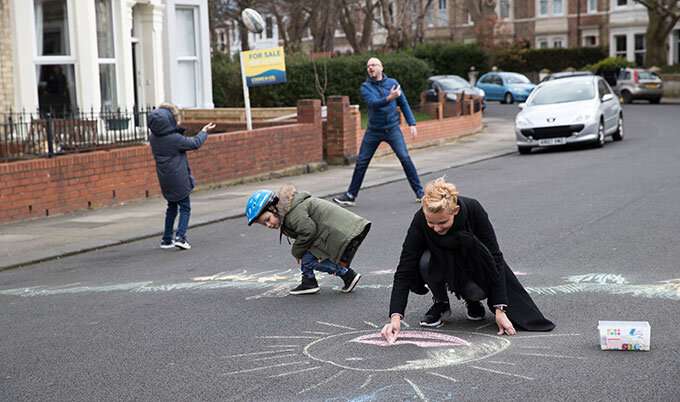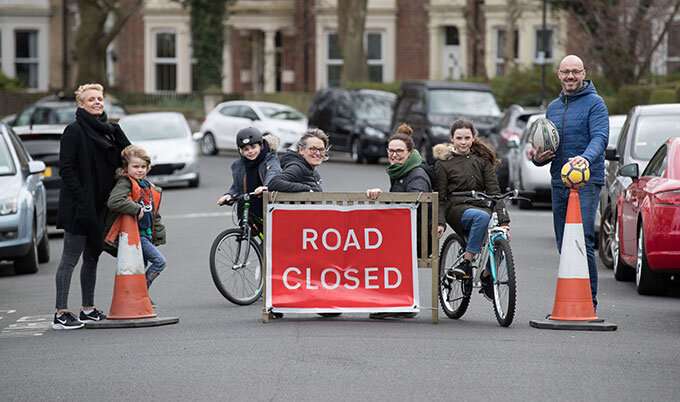A resident-led play street session. Credit: Newcastle University
Resident-led play street sessions can reduce loneliness and lead to greater community cohesion, but more support is needed to help residents set up and maintain these sessions.
Better connections with neighbors
People living on streets where children regularly play out said they know their neighbors better as a result and their street feels friendlier and safer.
Research carried out by Newcastle University in collaboration with Playing Out—the national, parent-led movement aimed at restoring children's freedom to play out near their home—highlighted that resident-organized playing out sessions were a way for children of different ages and from different schools to meet and play with each other.
Adults said that playing out gave them the chance to make new connections with neighbors of all ages, regardless of whether they had children. These friendships often extended beyond playing out sessions into the exchange of help between neighbors and other support. Residents also said that they say hello to their neighbors and stop to chat to them more often as a result of the connections they have made.
The research also highlighted that much of the work in organizing neighborhood playing out sessions falls to small groups of neighbors. The study authors say local authorities should recognize and value the contribution of this resident-led, grassroots movement in helping to tackle loneliness and disconnection in communities and are calling for more support for residents to establish and maintain playing out on their streets.
Professor Alison Stenning, chair in social and economic geography, said: "Playing out is not just about play and not just for children. It promotes an increase in neighborliness, a sense of belonging, and safer, friendlier streets.
"This research has shown that resident-led temporary play streets can play a role in helping to alleviate loneliness. This, along with many other social and community benefits, suggests that there's a strong case for more support from government and local authorities to ensure that playing out is something that everyone in any community can take part in."
A resident-led play street session in North Shields. Credit: Newcastle University
Resident-led
Loneliness has been identified as a growing social issue with public health impacts equivalent to smoking and obesity, and in recent years a number of national campaigns have tried to make more connections between people in their everyday lives.
The government's strategy on loneliness, published in 2018, suggested physical activity, community sharing and befriending—all integral to playing out—can help tackle loneliness.
The model promoted by the Playing Out movement is based on temporary road closures in residential areas to allow children to play and neighbors to meet. Closures usually last two to three hours and playing out sessions typically take place weekly, fortnightly or monthly. In most cases, residents set up the closures using "Road Closed' signs and secure them with volunteer stewards from the street.
Among other issues identified by the research was the need for more support to get a broader range of residents taking part in the sessions. Specific recommendations include street organisers to add on activities such as litter picking or book swaps to give neighbors, especially those without children, a greater incentive to join in.
The research also suggests that local authorities and community groups should allocate more hands-on support and financial resources to enable residents, particularly in less connected communities, to start and sustain regular playing out sessions, the research team say.
Stronger, more connected communities
The report is particularly timely, as the current coronavirus pandemic brings home the importance of micro-local support networks and looking out for elderly, isolated or vulnerable neighbors. Playing Out is joining Eden Communities in calling for a Community Action Response to the crisis, with a focus on caring for and connecting with those around us, virtually, by phone or having conversations and running errands with safe physical space. We will need to find new ways to help each other.
Alice Ferguson, co-director of Playing Out, said: "We have seen for ourselves how the 'playing out' model brings people together and leads to friendships between neighbors of all ages and backgrounds. It is fantastic to now have academic research clearly showing that this is a key outcome of resident-led play streets.
"Stronger, more connected communities where people know and trust their neighbors are important in so many ways, particularly for children. Alongside a happy family life, children need that sense of belonging to a wider community where they have friends they can call on to play with and adults they can call on for help."
More information: Tackling loneliness through playing out: playingout.net/why/research/
Provided by Newcastle University

























